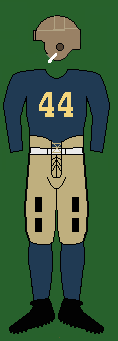1932 Michigan Wolverines football team
Under fourth-year head coach Harry Kipke, Michigan compiled a perfect 8–0 record, outscored opponents 123–12, and won both the Big Ten Conference and national championships.
Michigan won the Rockne Trophy, edging Southern California in the Dickinson rating system.
The Associated Press wrote, "Without Newman providing the winning spark, the Michigan team might have been just another football club.
"[2] Center Chuck Bernard and end Ted Petoskey were also selected as first-team All-Americans by some selectors.
[7] Gerald Ford, who later became the 38th President of the United States, was the back-up center on the team and won the Meyer Morton Award as the most improved player in spring practice.
The only first-team All-Americans from the 1931 squad, center Maynard Morrison and end Bill Hewitt, did not return to the team in 1932.
[8] Conn wrote that Kipke's challenges were made worse by a "suicide schedule" and added:"No one can accuse the Wolverines of gaining a synthetic title if they can clamor triumphantly thru that list.
In fact, it looks like Michigan athletic fathers had their eyes on the financial possibilities of such a schedule rather than a victorious season for their famed 'champions of the west.
The article focused on the "natural apprehension" of Coach Kipke in facing eight major opponents on eight consecutive Saturdays.
Quarterback Harry Newman had a 35-yard punt return and successfully kicked two point after touchdown (PAT) attempts.
Rentner fumbled on the first play after the opening kickoff, and Ivy Williamson recovered the ball for Michigan at Northwestern's nine-yard line.
Northwestern fullback Ollie Olson threw a 22-yard touchdown pass to George Potter later in the first quarter.
Early in the third quarter, Stanley Fay prevented a touchdown, knocking the ball out of the hands of an Ohio State receiver in the end zone.
Willis Ward, the first African-American to play for Michigan in 40 years, got his first start, replacing Petoskey at right end.
On the opening kickoff of the second half, Newman returned the ball 76 yards to the Illinois 19-yard line.
Behind the rushing of fullback Jack James, Princeton dominated in the first half, converting seven first downs to one for Michigan.
After returning a punt to the Indiana 48-yard line, Newman dropped back on a fake pass play and then ran for a 34-yard gain.
Michigan's first touchdown came in the second quarter on a 70-yard punt return down the middle of the field by Harry Newman.
The second touchdown was also scored by Newman, this time in the last minute of the game on a 28-yard run off a fake pass play.
Despite the lack of offensive production, Michigan won the game, 3–0, on a field goal at the end of the second quarter.
The score was set up when Minnesota fullback Jack Manders fumbled the ball near the end of the first half.
Harry Newman kicked the field goal, narrowly missing the upright to give Michigan the only three points scored by either team.
[26] Eight teams finished the 1932 college football season with unbeaten and untied records: Auburn, Colgate, Centenary, Jefferson (Texas), Michigan, Valparaiso, Southern California, and Brown.
On November 28, 1932, Professor Dickinson announced that the field of teams eligible for the Rockne Trophy had been narrowed to Michigan, Pittsburgh (despite two ties), and Southern California.




